Howard Dean Guest-hosts Topic [A] With Tina Brown
August 8, 2004
[ Jump to Racism in America, Electronic Voting Machines,
Margaret Cho ]
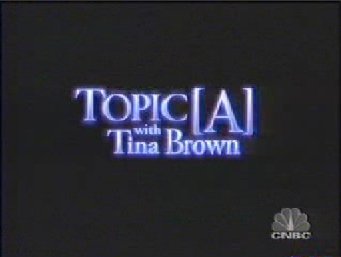
CNBC Announcer: Sitting in tonight for Tina Brown, is Governor Howard Dean.
Governor Howard Dean: Tonight I want to talk about two topics that I'm passionate about. The first is a
conversation about race
and racial justice. The second is electronic voting machines, and the possibility that elections could be
rigged in America.
My first guest, however, is Jon Stewart, who's remaking the media in this country. Host of 'The Daily Show',
a show that's not only successfully funny, but one that's become the news source for millions of young people
under the age of 25. [Stewart shakes his head 'no'] Jon, thanks for joining me.
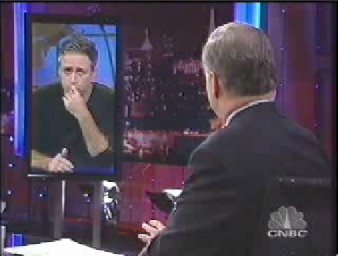
Jon Stewart: Ah, first, am I on the disembodied screen?
Dean: You're on the disembodied screen. I'm sitting here in (Castaic?) New Jersey and you're in New York.
Stewart: What's happening?
Dean: Well, I don't know, I'm going to find out from you. You're my first guest. Are you nervous or excited?
Stewart: Are we talking about racial justice, or are we talking about electronic voting machines? Because I
wanna let you know, I am equally unprepared for either topic.
Dean: We're actually not going to talk about either one of them. I'm going to talk to you about all the things
that are going on in the media because of what you're doing. You may recall, that I gave you an exclusive
interview, and you seemed to focus on my anger. [amused] I don't understand why.
Stewart: I don't know why we picked up on that, but I want to assure you, that after doing our show,
you saw a real boost in your poll numbers.
Dean: [Laughs] Let's take a look at this.
[begin video]
Stewart: The media has tried to pigeonhole you...
Dean: Mm hmm.
Stewart: ...as an angry guy.
Dean [dubbed "thinking"]: {The press! Those lowdown no-good ruzzamatuzzama[bleep] razza [bleep] [bleep]
mazzamazzamazza...}
Stewart: Governor, are you angry now?
Dean: Most certainly not.
Stewart: [Glances briefly down at his watch & then leans forward] How about now?
Dean: No, not really.
Stewart: Well, let's move on. --Now?
Dean: Naw.
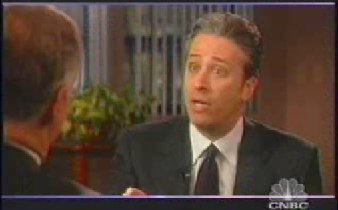
Stewart: Let's talk New Hampshire. I'm an undecided-- [leans forward and points at Dean] How about now? Now?
Dean [shakes head]: No.
Stewart: Let's talk issues.
[Long pause while they stare at each other]
Stewart: W-w-why don't you start.
Dean: Health insurance for every single American. the only country in the world...
Stewart [dubbed "thinking"]: {I'm dumb! Duh. Da duh. I like to eat buttons. Deet deet da da dat dauy... Dumb!}
Dean: ... those special interests have too much influence in Washington .
Stewart: Our show is a perfect venue to talk directly to young viewers. So if you could,
if there's anything you want to address to them?
Dean: I find that young viewers care deeply about the environment, and things like renewable energy.
They care about the balanced budget, because they know that--
Stewart [stops him]: I'm sorry, Doctor. Y- younger.
Dean: Um, people care about green grass, and they care about not spending any more money than they actually--
Stewart [stops him]: Younger.
Dean: People worry about cleanliness, outside, and they worry--
Stewart: --You know what, can you just jiggle your keys?
[Dean's face is SFX'd in a halo as if he were "Our Mr. Sun" and there is a sound of tweeting birds in the b.g.]
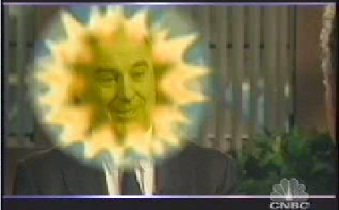
Stewart's voice: That's right. Thaaat's our audience.
[end video]
Dean: My problem with that take, is that, I was laughing so hard I can't remember the point I was trying to make.
Stewart: That's a pretty good tape, right?
Dean: It's a great tape!
Stewart: It is the magic of editing, my friend.
Dean: I want to get serious with you for a minute, but before I get serious with--
Stewart: -- Racial justice!
Dean: Yeah, we're gonna do that too.
Stewart: All right.
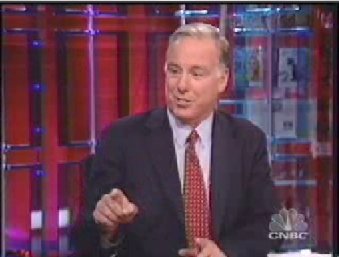
Dean: But, you are remaking this country, in the way that
kids get media -- kids see that, that may have been the only look at the New Hampshire primary
that they were getting. How is it working, and how are you doing that?
Stewart: First of all, I think that kids actually are seeing a much vaster array of media than ever before,
and we are but one more prosciutto with melon that they come across during their day. And that as far as
I can tell,
the kids that are involved in the process are much more savvy about media, than certainly I ever was when I
was a kid, and certainly when I was in what they would consider the target demographic, although back then,
I don't even know if we had demographics.
Dean: The interesting thing about this --
Stewart: Yup.
Dean: -- is that there is a survey, which I'm sure you're well aware of,
which showed that over half the kids, I think it was under 30 -- I'm not sure if it was 25--
get their news either from you and/or some combination of the Internet. Now you may remember in high school,
I'm sure we both had civics teachers that taught us that what we were really supposed to know is not
the facts, it was the ability to critically put together lots of different sources.
Stewart: Right.
Dean: First time, we're
about to do a national experiment based on what you're doing on television to find out if that really works or
not.
Stewart: Wait-- we're doing a national experiment?
Dean: We are. You are.
Stewart: Am I getting royalties on this?
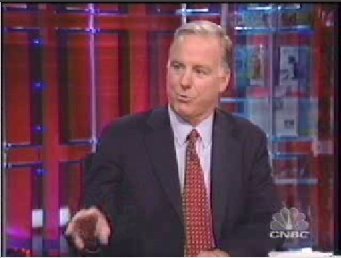
Dean: I don't think you're getting the royalties, but we're gonna find out if people really
know how to critically think in this country, because they're not gonna any more get their news in a filtered
way. What you're doing is showing unfiltered-- and what they get off the Internet is unfiltered news,
Stewart: Right.
Dean: And they get news in the really interesting perspective from you that is not directly related to the
value--
Stewart: --Well--
Dean: --judgements.--
Stewart: A very small group of people that are searching for a little bit of humor with their content.
I mean, it-- if you're getting your news from us, I don't think the show's gonna make much sense.
I think you'll watch it the way Charlie Brown's teacher talked. You know, it's gonna just sound like
'wah wah wah wah Iraq'.
Dean: How do balance your-- we know some people who call fair-- who talk about fair and balanced--
Stewart: --Yeah.
Dean: --that aren't. How do you bal-- how do you put balance in your coverage?
Stewart: We don't.
Because we don't consider it coverage. We consider it comedy. We have no agenda in terms of presenting even a
smidgen of a balanced perspective or context of a media event, we are literally-- all we are trying to do is
present a context for our jokes.
Dean: I actually think you do have an agenda, and--
Stewart: --What?--
Dean: --and I'm gonna tell you what I think it is.
Stewart: It's communism. Don't blow it for me!
Dean: I think it's telling the truth. I wanna-- you did an extraordinary piece of journalism on
the Martha Stewart verdict. The Martha Stewart verdict came down and it was misinterpreted. I wanna show you
a clip from your show, about something that's gonna --
Stewart: --Good. Show me that clip. Because I don't watch my show. I don't care for it.
Dean: Well, you're gonna see this and I think this is a really, an important piece of journalism, they're gonna
show in journalism school, I know that scares the daylights oughtta you--
Stewart: -- No! --
Dean: --gonna ruin your reputation, Jon...
Stewart [resignedly]: All right...
Dean: --Look at this piece.
[begin video clip]
Stewart: The Stewart verdict was a big story when it came out on Friday. But imagine a nightmare world
in which you've been forced to wait for that verdict one minute longer.
Well, thankfully, that horrific scenario never unfolded, thanks to reporters inside the courtroom,
who despite a ban on cameras and cellphones, devised an accurate, foolproof system...
[Audience starts to chortle]
Stewart: ...to notify their colleagues of the result.
[cut to video of a woman dashing out the door and down the courthouse steps past some guards. She is
frantically waving a red scarf.]
Stewart: Yes. Color coded scarves!!!
[the woman is followed down the steps by other people holding up a red sign, and waving red scarves etc.]
[Stewart's audience cracks up.]
Stewart: And numbered signs! Yee haaa, that was exciting!
[video's camera focuses on a woman standing on the steps whirling her red scarf about her head.]
Stewart: Look at me! I'm Edward R. Murrow!
Someone in Audience: Whoooooooooo!
Stewart: Whooo! Not the most dignified moment for America's press corps. Though their actions did lead to the
successful arrival at the courthouse...
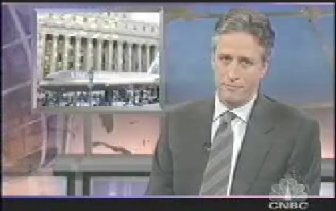
...of United Flight 441 from San Diego.
[Audience laughs and applauds]
Stewart: Okay. For more on the trial and the way it was covered, we go to Daily Show's senior correspondent
Stephen Colbert ["col- bear"] live outside the courthouse here in New York. Stephen--
Stephen Colbert: --Jon!
Stewart: --Thanks for joining us.
Colbert: Jon, before we talk about the trial, I'd like to apologize to you. I know we agreed ahead of time that
if the verdict was 'guilty' I would wave a red flag, and if it was 'innocent', wave a blue flag, but in the
excitement of the moment, I came out waving the severed head of a cat.
[Audience cracks up]
Colbert: Which obviously can be interpreted any number of ways. I'm sorry to have put you in that position,
it won't happen again.
Um... yeah, it won't happen again.
Stewart: Well, thank you, Stephen, your apology is accepted. But let's move on to the trial--
Colbert: --Also, Jon, I should apologize to that woman I knocked over in my haste to report on this story.
Though in my defense, who parks their wheelchair at the top of the courthouse steps?
[Audience laughs]
Colbert: You'd think an 80-year-old would know better! Anyway, my condolences to her family. And to the
families of those she struck on the way down.
That's a lot of steps, Jon.
[End video clip]
[in the interview, Stewart is desperately trying to stifle his laughter]
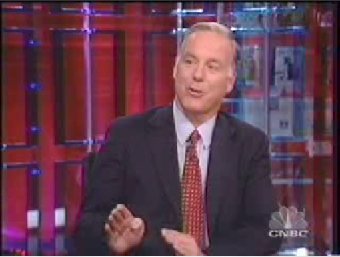
Dean: Now, it's hard for me to keep a straight face, which I did not manage to do throughout that entire
clip, but in fact, there's an incredibly important principle here. I just wanna get you to talk about
this a little--
Stewart: --Well, if you know what the important principle is, tell me, because we have no-- I show up drunk
around 5.
Dean: --You know--
Stewart: --I don't know what's goin' on around here.
Dean: Jon, I do not know one other person in American journalism who would dare to do that. I do not know--
of all--
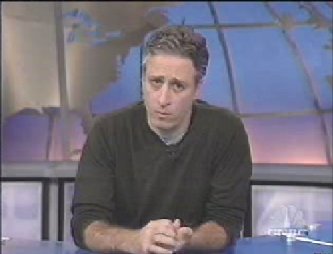
Stewart: -- Well, because they're-- they're not trying to be funny. Ultimately, if we stop being funny, our show
ceases to exist, or shouldn't exist.
Dean: I agree with that, however, I think you're being overly modest. Or, maybe you really don't believe it.
First of all, you work probably as hard as anybody else does, who's trying to change society. I-- I'll accept
that you may not have a particular direction. But the truth is, I have not seen any piece of journalism in
the last five years that did what you just did on that show. It takes the ridiculousness of some of the things
that are wrong with American media and hoists them up the flagpole. You, I'm sure, understand and know, that
humor is probably the most potent weapon there is in terms of creating change, or at least creating the
intellectual atmosphere to ask...
Stewart: Right.
Dean: ... the questions that lead to change.
Stewart: Well, I--
Dean: -- so I --
Stewart: -- I think in some respects it's a reflection of the need for change, but not leading to it. You know
there was a great quote, I think by Peter Cook, who was a great satirist with Dudley Moore...
Dean: Right.
Stewart: ...And they were talking about how the greatest satirists ever, existed in Berlin in the 1930's. And
Peter Cook had a great line, I think which was, "Yeah, they really showed Hitler." [impish smile]
[Dean chuckles]
And I think that's apropos here, in that it is-- for us it is a great catharsis, and it's a wonderfully
releasing-- and if it stimulates a dialog, that's great, but that's certainly not the goal, and the goal for us
is, to scratch an itch that we have, watching this, and sort of reveling in the absurdity of it all.
[Station Break:]
CNBC Announcer: Up next-- more with the Governor, and Jon Stewart.
Stewart: I don't think there's any greater discomfort than sharing a quiet moment via satellite TV with a man
you're making jokes about.
[Dean laughs off camera]
[End of station break]
Dean: ... a clip from the Democratic National Convention.
Stewart: Sure.
[Begin video clip]
Stewart: ...back to the program. Now, John Edwards' vice presidential address was but the culmination of last
night's convention program. The theme was actually, 'a stronger more secure America.' The goal-- convincing
voters Democrats were tough. Their method...
Dennis Kucinich, Former Presidential Candidate [yelling passionately]:
Courage America! Courage America!
John Kerry, America!
Stewart: ...volume.
[Audience laughs]
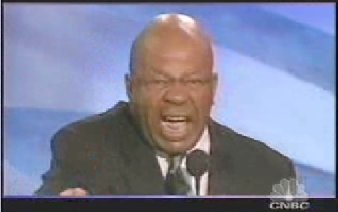
Rep John Lewis: This! Is! The most important election of our lives!
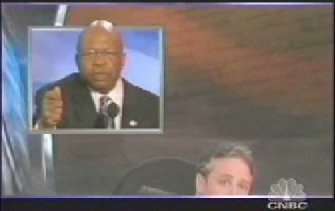
[Cut back to Stewart]
[More audience gales of laughter]
[Stewart peeks up above the edge of his desk a couple of times, as if "is the coast clear?"]
Stewart: ...All right?
[End video clip]
Dean: I thought the next clip was gonna be, "and then we're going to South Carolina, and after that we're going
to Michigan..."
[They laugh]
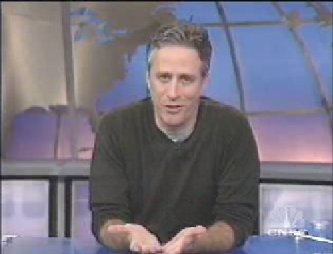
Stewart: Yeah, that-- that-- You know, what's interesting is, we didn't actually make a whole lot of hay out of
that speech that you had made, because there was something inherently... you know, dishonest about making fun
of it, to a certain extent.
Dean: Like 'cause it made fun of itself? [laughs]
Stewart: In some respects. Do you know what I mean-- it's like, it's like when something sort of presents itself,
it's sort of like-- people kept saying this at the Convention, 'Hey, you gonna show John Kerry makin' that pitch
and not hitting home plate?' And we thought, 'Nah, we're probably not gonna show that, 'cause that doesn't
really... that doesn't seem funny to us. That's... we find more funny in the space between the theater of what
people are trying to project, and the actuality of what they're really thinking.
Dean: What's more fun for you-- politicians, or your own media?
Stewart: I think the media's more fun because, politicians, in some respects, they're doing what they're doing.
It's sort of like, with Siegfried and Roy, when the tiger attacked Roy, a tragic situation but, that's what
tigers do. Tigers are-- they're wild animals.
And so, to a certain extent with politicians, you don't begrudge them their inane or, their duplicitous nature,
because you sort of have a sense-- and that may sound cynical, because it's meant to-- but... the media has
the responsibility of working for us, to break through that. And so, in some respects, we're more disappointed
in that than we are in the actual politicians. It's-- how can you be mad at an aluminum siding salesman for
trying to get you to buy aluminum siding?
Dean: And what do you do when you're confronted with a politician like me, who laughs with you?
Or is that what we're all supposed to do?
Stewart: We weep silently.
[Dean laughs]
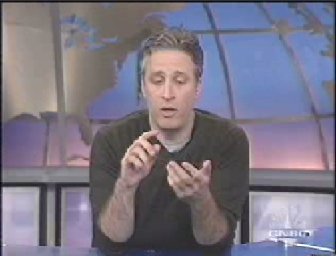
Stewart: I mean-- you know-- it brings up an interesting point. For instance, when you came on our show,
it was right after that speech.
Dean: Right. It was the damage control.
Stewart: Right! And that is-- so, to a large extent, we are complicit in that process.
Dean: Yeah.
Stewart: In other words, we knew that our only access to you was gonna be based on your need. So in some respects,
that plays into exactly sort of what I'm saying, is that when you felt, or your strategists felt, the need to
humanize, or bring humor to your persona, you sort of bring in-- you know, it goes, "what was that dancing
monkey's name we met in New Hampshire, Stewart? Bring him in." [Dean chuckles] "We can do this."
So that, to me,
is part of the natural process of being a politician. And by the way, being in New Hampshire and watching the
brutality of what you guys have to go through, within that media, I guess there's no other word for it, than
'circus,' you gain sort of a newfound respect for... anybody not having a 'shove it' moment. I would think
every one of you would have a moment during a campaign, where you take a Sean Penn swing at a photographer.
Dean: Well, I got two things to say about that. First of all, I think the Kerry/Edwards ticket went up about 8
points when Theresa ["ter-ay-sa"] said 'shove it' to the reporter, 'cause who wouldn't like to do that...
Stewart: Sure.
Dean: Secondly, Gary Hart once told me, "there's no such thing as a wimp that becomes President of the United
States," and that's exactly why. I wanna show you a clip of what you had to say about me at the Convention, just
for fun.
Stewart: All right, sir.
[Begin video clip]
Stewart: Then it was time for the walks of shame. Gephardt, check. mmMMosely-Braun, check. And you can't spell
'failed Democratic candidacy' without D-E-A-N.
Dean is widely credited with re-energizing the party with his populist message. Which made this 'Lifestyles of
the Rich and Famous' cutaway on C-Span-- awkward--
[C-Span video clip]
Dean: I am proud of John Kerry's leadership...
[cutaway to Chelsea and Hillary Clinton smilingly clinking two champagne flutes together, then turning to
watch the speech.]
Dean's voice: ... and I intend to stand shoulder-to-shoulder...
[Chelsea puts her flute down on the floor next to her.]
Dean's voice: ... with him as we fight for the things...
[Hillary takes a sip from her flute]
Dean's voice: ... that Harry Truman promised us...
[Hillary-- bottoms up.]
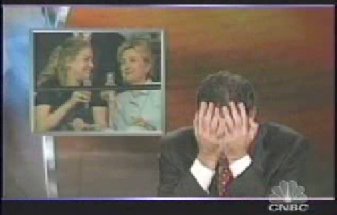
[Cut back to Jon Stewart]
[Stewart's audience is roaring with laughter and clapping]
[Stewart comes up]
Stewart: Well, all I can say is, it's a good thing that they cut back when they did or America would have seen
Hillary and Chelsea ...
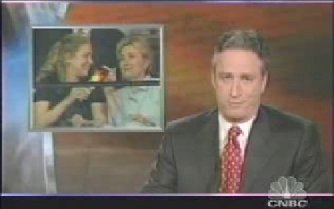
...lighting their Macanudos with a C-note.
[Audience laughs]
[End video]
Dean: All right, I gotta ask you one question. Did you edit in that clip of Hillary and Chelsea?
[Stewart shakes his head 'no'.]
Stewart: No, that's the actual cutaway that was on C-SPAN.
Dean: So the truth is always stranger than fiction.
Stewart: You know, there's a certain journalistic integrity to fake news, Dr. Dean, that... [Dean laughs]
By the way, I don't think there's any greater discomfort than sharing a quiet moment via satellite TV with a man
you're making jokes about.
[Dean laughs]
Dean: You know, I think it's kind of fun.
Stewart: That was, that was... that was very interesting. Now, are you enjoying--
you're very good at what this is, do you think this is gonna be more of a career for ya?
Dean: I don't think so. I really like public service a lot, and sometime over a... you can have a beer and I'll
have a Macanudo or something... [laughs]
Stewart: And you'll describe--
Dean: --We'll have that discussion.
Stewart: Oh, so you like... [makes quote marks with his fingers] "helping people".
Dean: You know...
Stewart [shakes his head]: Pffft.
Dean: ... it's a terrible thing, but I do.
Stewart: Naw, I think it's great.
Dean: Well, Jon Stewart, pardon me for toadying up to you as a member of the media, but you're a good guy.
Stewart [guffaws]: Ahhhhhh!!!!
Dean: Thanks very much for joining me.
Stewart: You're a nice man to say that, Doctor.
Dean: Thank you.
Stewart: And I appreciate that. And good luck with this endeavor. I hope you're enjoying doing it. You're
awfully good at it.
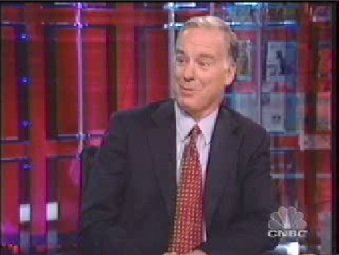
Dean: Thanks for having me on.
[does a double-take]
I mean, thanks for being ---
Stewart [guffaws]: Ahhhhhh!!!!
Dean: Thank you for coming! [he's laughing too]
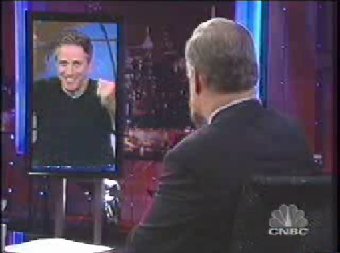
Stewart [makes a triumphant gesture with both fists]: Yesss!
[Station Break:]
CNBC Announcer: Up next-- an honest conversation about race.
Tom Leykis: You can't talk about race and win!
Tavis Smiley: ...it's one thing-- I think it's cowardice...
CNBC Announcer: And later, Margaret Cho.
Margaret Cho [mock-screaming]: The gays, they might get married! They might-- they're starting families! [grins]
[End of station break]
Dean: Most white people in this country don't think that racial justice is a big issue any more. What do we have
to do to get white folks to understand that (a) real problem still exists. One of the things we have to do, is
to talk about it openly.
My guests are Tavis Smiley, talk show host on National Public Radio, and Tom Leykis ["lye-kiss"],
the host of the Tom Leykis Show.
Tavis, the Wall Street Journal wrote about a study that showed that white job applicants with a drug conviction
were more likely to be asked back for a second job interview than Black applicants with no criminal record.
How can this be happening 50 years after Brown vs The Board of Education?
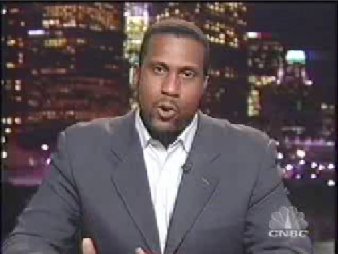
Tavis Smiley, NPR & PBS Talk Show Host: Well, first of all, Governor, it won't surprise you to know that there are any number of studies
and surveys that point to those kinds of facts, unfortunately routinely. I just saw another study the other
day that suggested that African Americans with names that sound African American are the least likely to be--
least likely to receive a return phone call when they go apply for a job. They don't get callbacks for
interviews because their name happens to sound Black.
So, in health, in economics, on the social structure,
there's so many issues and so many fronts on which African Americans are socially, politically, and economically
disenfranchised. So this study that you cite from the Wall Street Journal doesn't surprise me. In short order,
it seems to me, that racism, Governor, is still the most intractable issue in America.
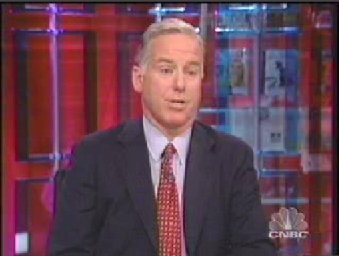
Dean: Tom Leykis, you have one of the biggest national talk shows in the country, radio talk shows... my guess
is that your audience is vastly, predominantly white. Why aren't white audiences worried about racism in this
country?
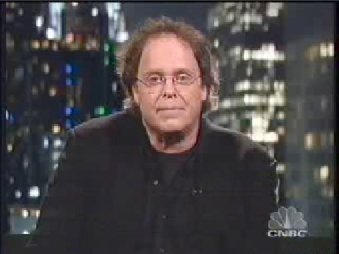
Tom Leykis, Host on Westood One Radio: Because they're not victims of racism. White audiences--
and in fact there are many audiences
that are not victims, frankly. You could probably throw in Asian-Americans* to a certain extent as well--
we have stereotypes going in both good and bad directions. We stereotype-- there's a stereotyped Asian Americans
as being smarter, better at math, there's all kinds of stereotyping going on out there. Some people
benefit from it, some people do not.
(*Tom has evidently not heard the anecdotes from Asian-Americans of being called "gook", "chink" etc by
white passers-by. Negative racism exists for them too-- Crocuta)
Dean: Tavis, this has gotta be very frustrating for you. What do you say to Tom Leykis? I mean, he said it
all.
Smiley: -- Yeah, I--
Dean: -- Most people don't-- most white people aren't victims of racism, therefore it's in the back bin-- back
burner. What do you do-- what can we do about it?
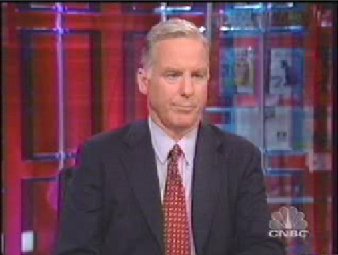
Smiley: Well, I think Tom's right about that. I wouldn't argue Tom on that. I would just take it a step
further and suggest to you that living in the most multicultural, multiracial, multiethnic America ever, and that
challenges us in a very uniquely different way.
To your question, Governor, then, previous generations...
I'm hopeful that because we live in this multiracial America, that this particular generation,
this "hip-hop" generation, as it were, is going to do a better job of building a new construct.
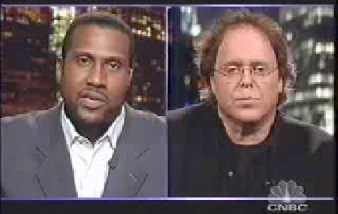
But ultimately
I think what's lacking is a conversation from the top down. The last politician I can recall who really got
some traction, who was not afraid to talk about things like 'white skin privilege', was Bill Bradley outta
New Jersey. I've heard you talk courageously about it, Governor, but there's not-- there's not enough
politicians, not enough elected officials in this country, save those who happen to be of color, who are
willing to advance a conversation about race in America, and I think that's part of the problem.
Dean: I wanna--
Leykis: -- May I say here though, and again, not because I disagree with you, Tavis, just because it's
reality. The politicians who talk about that, lose. They lose. Our host-- lost. Bill Bradley-- lost.
These guys could not become President. And, you have to realize that that's the reality of America-- it--
I agree with you that racism is still a very big issue in this country.
Smiley: Let--
Dean: --Let me show you a clip of somebody who was incredibly courageous, who was not a politician,
who said something very controversial, very recently, which has stirred an enormous amount of discussion,
both in the white and the Black community. Bill Cosby.
[Begin video clip]
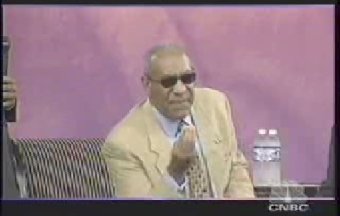
Bill Cosby, comedian: Ladies and gentlemen, we're not paying attention to the children. They're telling us
something.
[applause]
Cosby: When they come outta high school at 2:30 in the afternoon... I'm talking about profanity. I'm talking
about...
[Applause]
Cosby: ...people cursing at each other, like it's something "hip", like it's something that's right, when it's
not. I'm talkin' about people calling each other a name that there are still, if DNA goes to the Mississippi
River,
Audience member: Mmm hmm.
Cosby: ...You're gonna find African blood in there. Dead from being called "nigger" and then hangin' em. Where
did we get so comfortable ...?
[Applause]
Cosby: When and who gave us the word to say, "You don't need to know how to read and write"-- again?
[End video clip]
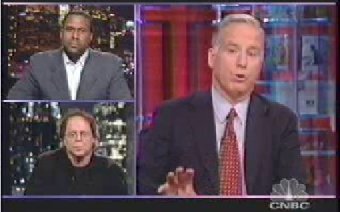
Dean: Now, I have two reactions to that clip as a white person who does know something about civil rights, and
was connected in some ways with some folks who were very interested in civil rights. One, this is an older
American looking back with-- more or less the perspective that I have, who doesn't really see this from a
younger perspective, where Black and white folks are beginning to share the same culture, (the ones
that are) under 25 years
old. The other thing that struck me when Bill Cosby said this-- this must have been an incredibly painful
moment in the Black community, who's not comfortable with sharing their dirty laundry with white folks.
Tavis, what do you think?
Smiley: With all due respect to Dr. Cosby, he's not the first person to say this. This ain't the first time
he's said it. It's not really an 'airing of dirty laundry' in Black America. Black folk have these kinds of
conversations all the time. Indeed, we get this kind of conversation every Sunday in Black churches. What
made this conversation different, what Cosby said, wasn't the aberration-- the aberration is that the white
folk in the media picked up on --
Dean: --yup--
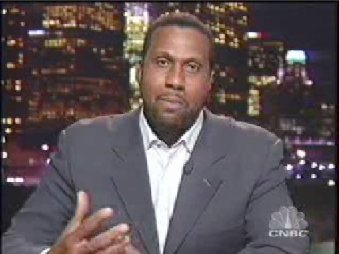
Smiley: --what Cosby said, and put it in the Washington Post and every other paper,
the AP and everywhere else. That's what kicked up this conversation. But Black folk have always been more
conservative on the moral questions, more liberal on the political questions, and so this kind of conversation
happens in Black America routinely. Go to any Black church on Sunday, or better yet, any Black barbershop on
Saturday, you get the same thing all the time.
Dean: Could Cosby represent an older, more conservative generation, and maybe it's possible that young folks
are sorting this out for themselves. What do you think, Tavis?
Smiley: There is another point to consider, it seems to me, and that is that one of the reasons why young
folk, and people of color in particular, are not as engaged as they ought be or should be or could be,
obviously, is because we live in a country where our media doesn't look like America. We have gotta make our
media look more like America.
I appreciate-- this will sound self-serving, and on some level I suspect it is--
but what I appreciate about my opportunities every day on NPR and PBS, clearly two "white" mediums, radio and
television... I get a chance to introduce Americans to each other every day. So that what you find is, our
demographics represent the youngest demo on NPR, the youngest demo on PBS, the most ethnically diverse demo on
either network, in large measure not because I'm the best guy out there-- because I'm the only guy out
there--
Dean: --All right--
Smiley: -- I'm the only guy--
Dean: -- Tavis --
Smiley: --speaking their language--
Dean: -- Tavis, let me interrupt for a second. What you're doing is incredibly important. I can't think
off the top of my head, of one single white talk show host or public media figure that does well in front of
Black audiences. [spreads his hands] What do we do to change that?
Leykis: Well, first of all, as far as politics are concerned, your majority in this country still, at this
point, is white. Many of them feel either guilt, or they just don't want to think about this subject, and so
I think for a politician who wants to win, unfortunately, it's suicide for them to talk about this subject.
Which is why we need the Tavis Smileys and others who are willing to step up to the plate. People who step up
to the plate in op-ed pages -- these are people who don't have to worry about winning a
popularity contest. But if it becomes a popularity contest, you can't talk about race, and win!
Smiley: What-- it's one thing, you know, Tom, for the politi-- I hear your point, I respect that. It's one
thing, -- I think it's cowardice -- but I think it's one thing for the politicians to not be expected to
talk about it (although they should) -- I just think that those of us in the media are not up to the challenge
of doing that, and until we get more folk who are making decisions about what we do every day, that represent
the cross section of America, we're gonna have this problem.
[Station break:]
CNBC Announcer: Coming up-- more on Bill Cosby's controversial comments.
Bill Cosby: Those of you who are cursing at your children at home... those children hear those words.
CNBC Announcer: And later-- the problems with electronic voting.
Bev Harris: I think we have a high probability of Florida-style meltdown in multiple states...
CNBC Announcer: Once again-- guest host, Governor Howard Dean.
[end station break]
Dean: Bill Cosby was probably the first crossover figure in my life. He was a -- he was really, he was
almost a-- he was a physician, he had a middle-class family on his television life, and he was, I think
the breakthrough African-American figure in American television. I think -- he's talking here about Black
parents and Black kids-- he could also be talking about white parents and white kids, and
the question is, how to send this out as a message to everybody in the country.
[begin video clip]
Cosby: Please. Those of you who are cursing at your children at home...
[makes a 'don't do that!' gesture with one hand]
Those children hear those words. When you put on a record, and that record is yellin' 'nigger'
this and 'nigger' that, and cursin' all over the thing, and you got your little six-year-old, seven-year-old,
sittin' in the back seat of the car, those children hear that.
Audience [softly]: Yes.
Cosby: And I'm telling you that when you put the CD on, and then you get up and dance to it! What are you
saying to your children??
[end video clip]
Smiley: Dr. Dean, you know it's actually-- real quick about that. It's important to understand,
when he
talks about hip-hop music, for example, with cussing and degrading language in it-- 70%, seven-zero, 70% of
rap music is bought by white kids in suburbs.
So the point I'm trying to make is very simply this. That the issues that Mr. Cosby raises are not just for
Black folk, we've got a parenting crisis in America, period. There are more single-parent families in America--
not just in Black America-- in America than ever before. The nuclear family has changed in this country.
So again, what he's talking about is not just a Black dynamic, but when he raises it in the context of a Black
conversation, and the mainstream media picks it up, you see what happens.
Dean: I totally agree with that. I think it is so-- I have two teenaged kids. And they are very into this
culture...
Smiley: -- hip-hop.
Dean: ... In fact they have caused me to have my favorite author, or favorite artist, be
Wycliffe John.
Smiley: Yup.
Dean: Because he has a lot of social commentary in his music, in addition to being a great musician.
Now, I think what this is about is more than Black America. I think this is about Black and White America and
it's about two generations. My generation, of which I would say that I was more or less one of Bill Cosby's
generation, I'm a little younger than he is, and then our kids' generation, who seem to be developing a
single culture, more color-blind I think, than when I was growing up all through this.
All right. Last few seconds-- Tavis Smiley, where do we go from here?
Smiley: Well, I think again-- we have to have a conversation-- we've gotta find a way to kick-start a
conversation about the most intractible issue in this country. I had hoped that Bill Clinton, when he went to
Africa as President, might have apologized for slavery. That would have started a conversation for sure.
We've gotta find a creative way to start that conversation. Short of that, my hope is that this generation,
this multi-cultural, multi-racial, multi-ethnic younger generation, will take us and this conversation into
places that we never thought possible 50 or a hundred years ago.
Dean: Tom Leykis, how do we move the white folks into this conversation?
Leykis: Well, don't expect it from mainstream media, because the job of the CNNs and the CNBCs and the Fox News
Channels is to make money, and they make money by generating heat, not light. So we have to depend upon the
people at podiums, we have to depend upon the people at soapboxes, and on the Internet,
we have to depend on people who
have the op-ed pieces, and we have to depend on the elder statesmen to make these kinds of comments, because
mainstream media, and politicians who wanna win the big office-- the biggest office in the land -- will never
win, and will never make money, by making this kind of comment.
Dean: Tom Leykis, Tavis Smiley, you guys are great. Thanks so much.
Smiley: Thank you Governor.
Leykis: Thank you.
[Station break:]
CNBC Announcer: Up next-- how easy is it to rig a national election?
Bev Harris: We just edited an election, it took us 90 seconds.
[end station break]
Dean: If you think the 2000 Florida election was a big problem, you ain't seen nothin yet. The 2004
elections promises to be a nightmare for a lot of voters, and it all centers around electronic
voting machines.
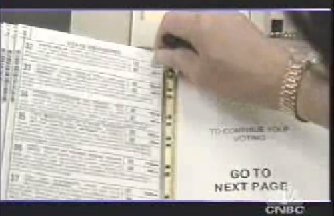
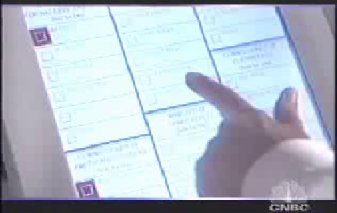
Dean's Voice, Narrating:
Maybe you're used to pulling a lever, or punching a card when you cast your vote. The odds are getting better,
(that) come November, you'll get a taste of a new and controversial trend-- electronic voting.
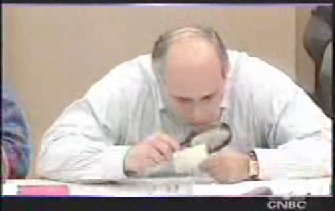
In 1998, only 7% of all U.S. counties used electronic voting machines. Then came the 2000 Florida fiasco,
and in its wake, the so-called Help America Vote Act of 2002.
Now, in order to qualify for millions of dollars in Federal funds, states are pinning their hopes on electronic
voting machines, manufactured by private companies like Diebold, ("Dee-bold") and Sequoyah. The result--
in the next presidential election, roughly 1 in 3 of us will use one.
But critics have found all sorts of flaws with these machines, from software security concerns, to the complete
lack of a paper trail to verify votes. These machines cannot be recounted.
In Riverside County, California, an incumbent mysteriously pulled ahead after the voting machine company
employees stopped the tally to tinker with the machines.
In Iowa [graphic shows "Allamakee County, Iowa"], machines in one precinct returned 4 million votes-- when
only 300 actual voters turned out.
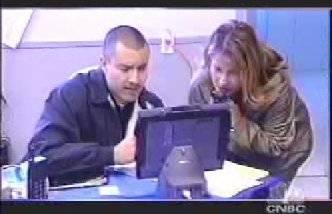
In San Diego, election officials reportedly turned to teenagers to reboot their malfunctioning machines.
Woman to Man, both huddled over a Voter Card Writer: I think we're on the wrong screen.
I know what happened! I know what happened! -- Crocuta
And in Florida, a computer crash erased the records from Miami-Dade's first widespread use of
touchscreen voting machines-- all data from the the 2002 gubernatorial primary is gone.
[end Video]
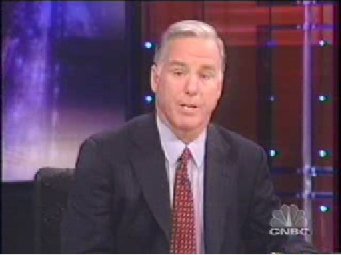
Dean: There are two problems. One, there's no paper trail which means you can't verify your vote,
and it can't be recounted.
The other potentially serious problem: tampering and rigging of elections. We asked Diebold, one of the
companies that makes these machines, and Florida Secretary of State Glenda Hood to appear on this
program. They both turned us down.
But Bev Harris is here. She's a crusader who thinks this is a disaster waiting to happen. Bev, you've made a
potentially blockbuster statement. In under 2 minutes, you can hack into an electronic voting system,
and change the results of an election with almost no chance of being caught. Bev Harris, how did you
discover this?
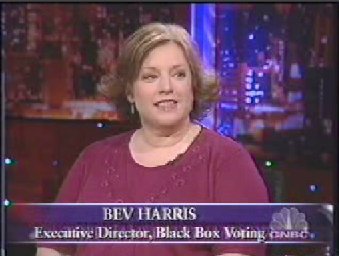
Bev Harris, Executive Director of 'Black Box Voting': Well, I found the software that they were
keeping secret, as a proprietary trade secret, and I found it on the Web quite by accident,
and I worked with several different computer scientists who were very helpful in terms of analyzing
the weaknesses. One of them had designed accounting software before. And of course, counting votes is
just a form of bookkeeping. And right away he could see the weaknesses in it, and he kind of walked me
through it like an AOL tech might walk you through something on the phone, he showed me how to rig an election.
Dean: If this is so easy to do, what in the world are we doing relying on this technology all over the country?
Harris: We need to get in there, and we need to actually demonstrate to some of the officials who are
making these decisions, how easy it is. Because they're really relying too much on the vendors.
Dean: Bev sat me down, and in a few short seconds I was amazed at what I could do.
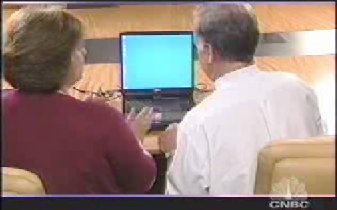
[Begin video:]
Dean: All right, Bev, show me how to do this.
Harris: Well, What we have here is the central tabulator computer. Now in a voting system you have all these
different voting machines at all the different polling places, sometimes, as in a county like mine,
there's a thousand polling places in one county.
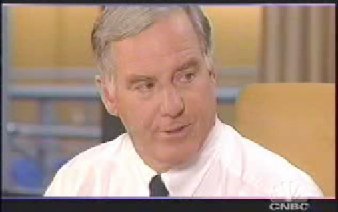
All those machines feed into the one machine so it can add up all the votes. So of course if you
were going to do something you shouldn't, to a voting machine, would it be more convenient to do it to the 4000
machines or to just come in here to one machine and deal with all of them at once?
What surprises people is the central tabulator is just a PC. It's like you and I use, it uses Windows,
it's just a regular computer.
Dean: So anybody who can hack into a PC, can hack into the central tabulator.
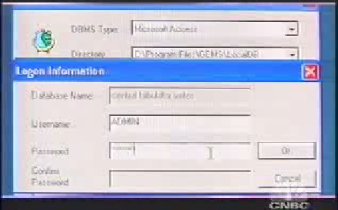
Harris: The GEMS program is the program that is the central tabulator program.
And I'm going to put in a password here. OK, we're in. Now this is the official program that the county
supervisor sees.
Dean: Is this the Diebold program?
Harris: Yes, this is a Diebold central tabulation program.
Dean: OK.
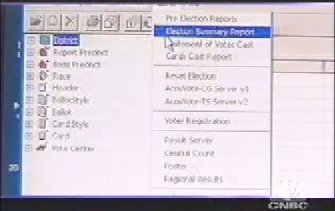
Harris: And then go to 'Election Summary Report', It's gonna-- we're in spin
for a minute, while it adds up all the votes from all the different precincts.
And as we can see here, Howard Dean has a thousand votes, and Lex Luther (sic) has 500
so you're beating Lex Luther and we're--
Dean [gleefully]: --Two to one!--
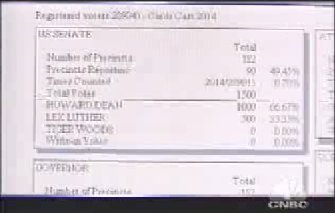
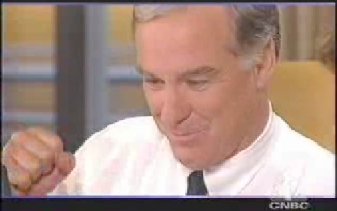
Harris: --Yes, and Tiger Woods unfortunately doesn't have any votes yet.
Dean: All right.
Harris: All right, let's close this out. I was just showing you the legitimate way to go in and look at
votes, which of course--
Dean: --All right--
Harris: --you can't tamper with.
Go to the Start Menu, and I'm going to show you something tricky. And I want you to go to 'My Computer'
and just click that, and you're going to see something come up, go to...
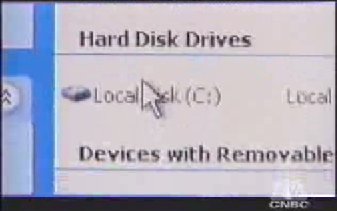
Harris: ...'Local Disc C:' and go to 'Program Files'.
And on Program Files we're going to go to 'GEMS', which is the name of the Diebold program...
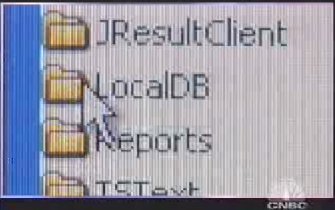 We're going to go to 'LocalDB', which stands for 'Local Database, that's where they keep the
votes. And by the way, this has been out on the Internet for ages now.
We're going to go to 'LocalDB', which stands for 'Local Database, that's where they keep the
votes. And by the way, this has been out on the Internet for ages now.
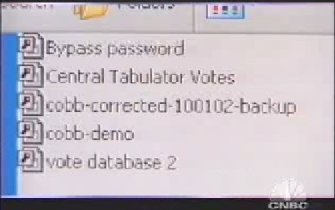 Harris: Go to 'Central Tabulator Votes', which is the database we just looked at...
Harris: Go to 'Central Tabulator Votes', which is the database we just looked at...
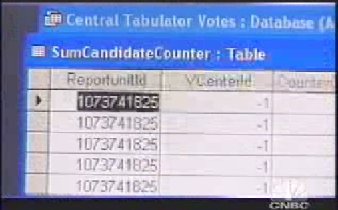 ...and then go to the 'Sum of the Candidates', which is that table.
...and then go to the 'Sum of the Candidates', which is that table.
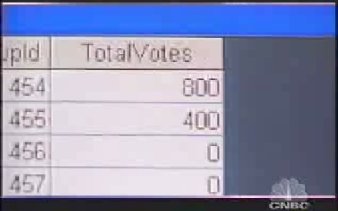
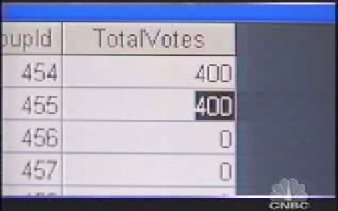
Harris: You see we have 800 votes here for you, and 400 for Lex Luthor-- Let's just flip those. We'll make that
400... and we'll give a hundred votes to Tiger.
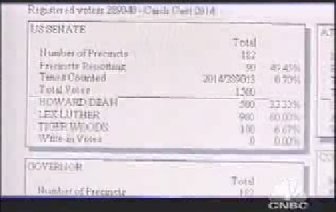
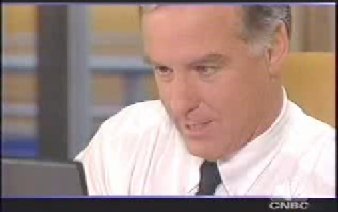
Harris: Let's just see what happened here.
We'll go back into GEMS the legitimate way, you're the county supervisor, you're checking on the progress
of your election, and as you can see now, Howard Dean only has 500 votes, Lex Luther has 900 and Tiger Woods
has 100 votes.
Dean: Hm.
Harris: We just edited an election, it took us 90 seconds.
[end video]
Dean: Bev Harris, this really points out why it's important to have a paper trail-- so people
can't alter the results. What is being done around the country to deal with this?
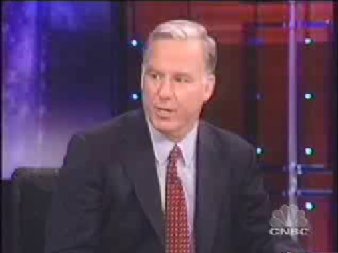
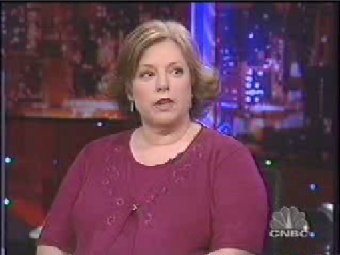
Harris: Well, there are some places where they are working on it. Kevin Shelley's had some real
backbone and he's been fighting the battle in California. In the state of Ohio they
have now mandated the paper ballot. But... not enough, and we've got an election coming up this fall
where we may have as many as 30% of America voting on machines that can't be recounted or audited.
Dean: I'm glad you gave Kevin Shelley a plug. We have Kevin Shelley, the Secretary of the State
of California. You're using e-voting in California. Why?
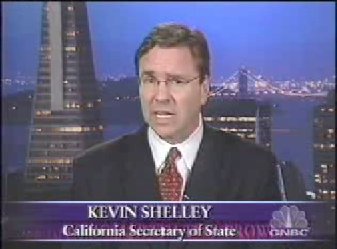
Kevin Shelley, California Secretary of State: In terms of California, Governer Dean, why we're doing
what we're doing, you know we're the only state in the entire country right now that has standards in
place for a voter-verified paper trail. I think it is absolutely essential that the voter have
the opportunity to confirm his or her vote. Not only so it can be used for recount purposes at a
later time, but also so that you know, and have-- the voter has the confidence, that their vote
will be correctly counted as they intended it, as it was cast.
Dean: How are you going to prevent hacking and fraud, though. You saw what Bev was able to coach me
to do in 90 seconds. How do you-- what-- do you have a mechanism in California to stop that?
Shelley: We absolutely do. As you may know, Governor, in a number of instances, we banned certain
machines-- the Diebold TSX machine-- in a number of our counties, including San Diego, which was
one of the topics of your piece. Beyond that, we've required very strict security measures.
Not only, the source code be made available to us, by the vendor, and we've demanded it, and we've
received it, the only state to do so, but also each voter having the option of voting on paper,
as well as, security measures with the machinery itself. Two specific measures that would prevent
the situation that Bev just was demonstrating to you-- we demand that, and require, that the
results be posted at the polling place, so that you can't later change the results of that particular
polling place when the officials at the master computer are counting them. Secondly, we also ensure
that there is a paper receipt. Now, it's not a voter-verified paper receipt, which is what we
would prefer, but a paper receipt that is immediately produced at the conclusion of the polling
hours, so that before it gets counted at the main location, that can be referred to, that has the
actual results on it.
Dean: Kevin, I spoke to Bill Bradbury, who's the Secretary of State of Oregon, and apparently,
in Oregon they have a law that says you cannot use any voting machines, unless the voting machines can
be recounted, which of course would cancel out any use of any of these kinds of machines.
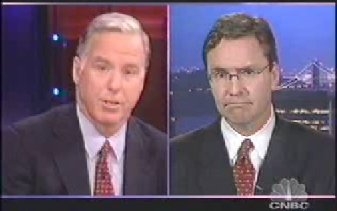
Talk to me, and Bev, jump in here too, about states that you think are-- that either of you think
are, at very high risk for a, "polluted" if you will, voting result, come November, and states that
have really done their job and that are pretty good bets for when voters go to the polls, their actual votes
are gonna be counted the way that they should.
Shelley: Let me speak to that, Governor, if I may, because I think we've taken very aggressive
steps here in California, and I came very close, as Ms. Harris knows, to just banning all the
machines outright, and we did ban them in certain instances, and in others we put in security measures.
But I--
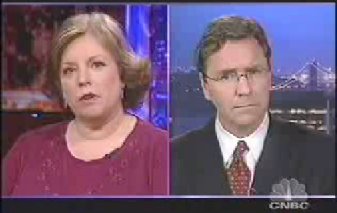
Harris:--But the security measures aren't really in. This is one of my concerns, is the exact hack that I
showed Governor Dean, is still in place in the brand-new software, and in fact I had that demonstrated
by a county supervisor the other day. And we found exactly that back door. So, we still have a
ways to go.
Dean: All right, let me ask you both a very tough question--
Harris: --It's vulnerable.--
Dean: Do you, Kevin Shelley, and Bev, do you consider the election in two thousand-- November election in 2004,
that's coming up, for President of the United States, do you consider that to be a safe election,
which is unlikely to-- which is likely to give us the results that
that indicate who the next President of the United States is?
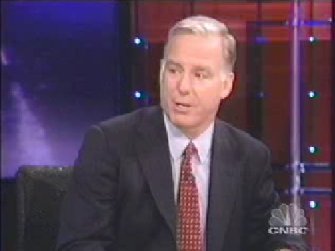
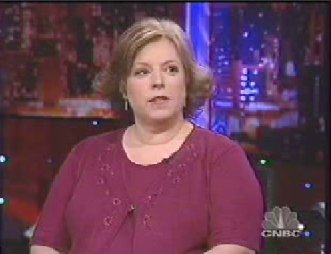
Harris: Unfortunately, I think we have a high probability of Florida-style meltdown in multiple states,
because we have not put the procedures in place that we need to have in place in all the states.
Dean: Kevin?
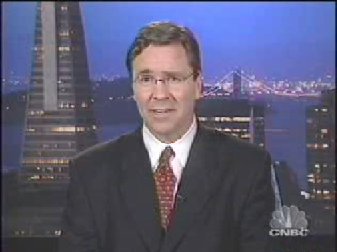
Shelley: You know, in your setup piece that showed that election official in Florida with the
magnifying glass looking at that chad-producing punchcard ballot, I don't wanna see officials trying
to hoist up an electronic voting machine on November 3rd, trying to look into the software, so I
think that it's important that everyone take aggressive security measures, ban the
machines where necessary. You never can have 100% perfection, but I think we need to take
aggressive approaches. That's not being done now, I think we have taken a very aggressive
approach in California, and we would call on others throughout the country to follow our lead.
Dean: Kevin Shelley, thank you so much, Bev Harris, thanks very much--
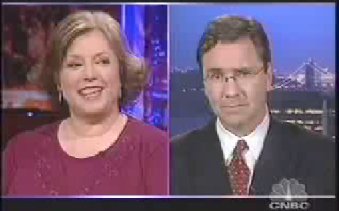
Harris and Shelley: Thank you.
Dean: Ask your local officials-- is your voting safe? The answer may surprise you.
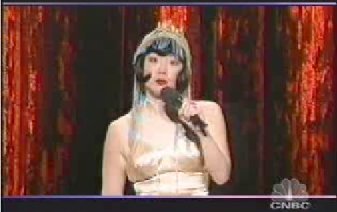
[Station Break:]
CNBC Announcer: Up next: outspoken comedienne Margaret Cho.
Margaret Cho: I'm hoping to get arrested. That's my big goal. (laughs)
[end of station break]
Dean: She is outspoken, she is edgy... some say she is too outspoken-- my guest is
comedienne Margaret Cho. Margaret, I was at the Democratic National Convention.
(slyly) Where were you?
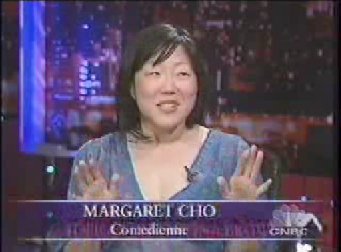
Cho: I was supposed to be there. I was actually supposed to be doing a performance for a
bunch of different gay and lesbian political groups there for the convention. And, um, it was all
set up, and I was all ready to go, and then at the very last minute, they rescinded the invitation.
So, thank you for having me on your show and not rescinding your invitation! (they laugh)
Dean: Will you do the same act that you were gonna do there, for--
Cho [laughs]: Well, the thing is, that, I was just gonna come out and really just talk, about what was happening,
and I think that there is such a paranoia about people having free speech, people having the,
sort of, right to say whatever they might say. There is such a wierd stranglehold on the liberal
community, where we're so afraid to speak for some reason. I don't know what it is. I don't know
exactly what it could be. Because the conservative agenda is all about how gay marriage is this
"new horrible thing" that may happen to America. That may just "completely erode the moral fabric
of America." When the Democrats and the liberals aren't saying anything against it. It was not--
it was not really talked about during the Convention at all.
Dean: So you wanna talk about it?
Cho: I wanna talk about it!
Well, because, why--
Dean: --So you think--
Cho:--is it so scary? --
Dean:--you think your invitation was rescinded 'cause nobody wanted to talk about gay marriage in
the Democratic National Convention?
Cho: No. I think, well-- I think part of it was that people just didn't want so much attention drawn
to that.
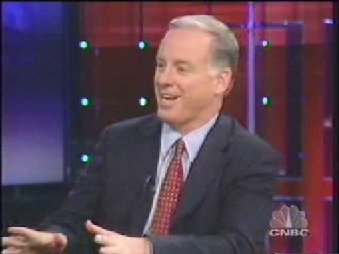
Dean: So what would you have said, if you'd been able to go-- here's your chance.
(grinning)Now you can say whatever you want, and you're on television.
Cho: Well, I would say--
Dean: --'Course they'll bleep you if you're not careful.
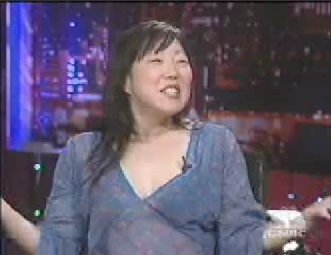
Cho: Well, what is so scary about gay marriage? I mean, that, to me, is the issue. It's like all
the conservatives are saying, you know, (mock screaming) "the gays, they might get married!! They
might-- they're ge-- they're starting families!! (end mock screaming) You know, and that's supposed
to be what we're so terrified about, when really there's so much more out there that's so... bad.
Dean: Now you are a very successful comedienne, and, what I wanna know is, how did you end up
getting into politics?
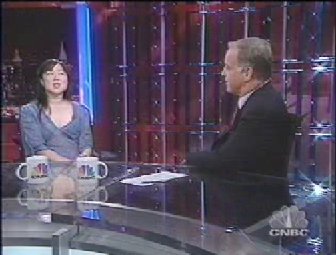
Cho: Well, you know, it's just, um, something that I felt was natural. I think, maybe going,
and performing, and doing shows, and growing up in San Francisco in the '70's, growing up with Harvey
Milk. And watching him be assassinated. And seeing that all played out, was a very political
city, and a very political time to grow up in. And so, being a part of AIDs activism in the '80's,
and growing up there, and wanting to make a difference somehow, really, just, it was a natural progression.
And politics are, just, really, go hand-in-hand with entertainment to me.
Dean: Mm hm.
Cho: You really have to have a political voice to be interesting.
Dean: Now you are about to go on a tour called "The State of Emergency," I think.
Cho: Yes.
Dean: Something like that?
Cho: It's "The State of Emergency" tour.
Dean: Tell me a little bit about it, and what are you doing and why-- what are you trying to
accomplish and what are you doing?
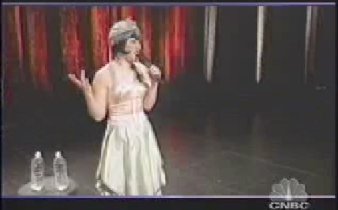
Cho's Voice: Well, I'm just going all over the place, and right now it's starting in swing
states until the Presidential election, and it's--
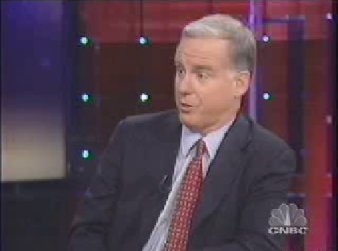
Dean: Seventeen states, you're going to do all seventeen battleground states?
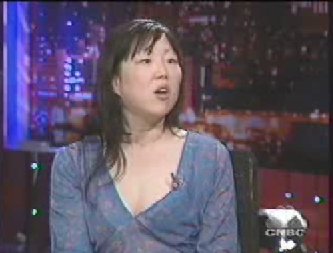
Cho [nods]: And, they're just to really talk about these issues, and talk about what is going on in the
news, like the recent terror alerts, which are--
you're so right to say that they were totally political.
They had nothing to do--
Dean: --Well, I wouldn't say that they were totally political, but I do think--
Cho: I think--
Dean: -- politics had something to do with it.
Cho: Well, in my mind, they're totally political.
Dean: Uh huh.
Cho: I mean they really have to do with keeping the nation in a state of panic. A 'state of emergency'.
Dean: And you're kicking this off in the Apollo, in New York.
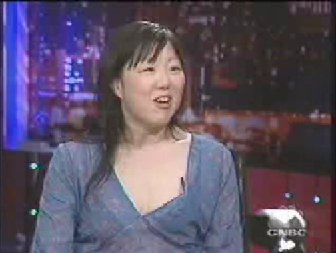
Cho: Yes, I'll be at the Apollo in New York City, during the Republican national convention.
So, I'm hoping to get arrested. That's my big goal. (They laugh)
Dean: How are you gonna do that??
Cho: Well, I heard that they're preparing for a thousand arrests a day, of protestors, so I'm
not sure exactly what I'm gonna do, but I'm figuring it out...
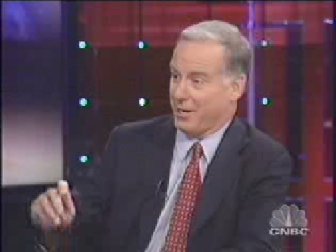
Dean: Just gonna go down and sign up, 'Please arrest me'?
Cho [laughs]: 'Please arrest me'. I'm not sure! I'm have to go figure it out. Go down to the free speech
zone.
Dean: Well do me a favor. If you're gonna get arrested, don't do it until after the 28th of September,
'cause I'd like to come see you in the Apollo. I've never seen you live--
Cho: --Yes.
Dean: --And I've never seen the Apollo Theater, which is one of the classic theaters in America.
Margaret Cho, thanks so much for being with me.
Cho: Thank you.
[station break comes and goes]
Dean: I'm Howard Dean. I want to thank all of my guests, and I want to thank all of you for watching.
(rueful smile) This job's a lot harder than it looks!
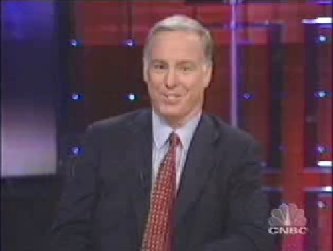
[credits, and:]
--- End ---
Video, Part A-- Jon Stewart. (42.4 Mb)
Video, Part B-- Racism in America. (33.3 Mb)
Video, Part C-- Electronic Voting Machines, Margaret Cho. (39.8 Mb)
Thanks mucho, 'balconycollapse', who originally recorded these and put them on the Web.
| 



